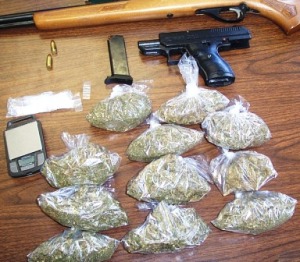 As Barack Obama arrives in Mexico for the first visit of his second term in office, talk has�inevitably turned�to the United States'�floundering�war on drugs in Latin America. And as efforts are made to scrutinize what the United States and Mexico are doing wrong, it's worth looking at where things are going right. In recent years, one unlikely victor has emerged in the global war on drugs: Iran.
As Barack Obama arrives in Mexico for the first visit of his second term in office, talk has�inevitably turned�to the United States'�floundering�war on drugs in Latin America. And as efforts are made to scrutinize what the United States and Mexico are doing wrong, it's worth looking at where things are going right. In recent years, one unlikely victor has emerged in the global war on drugs: Iran.It's a�favorite�topic for Iran's state-run news outlets. The Islamic Republic has been�lauded�by the United Nations Office on Drugs and Crime for having "one of the world's strongest counter-narcotics responses." While the country continues to have�one of the highest rates�of opium addiction, Iranian security forces seize a larger volume of heroine and opiates than any other country, according to a 2012�U.N. report.
In�October, Italy's U.N. representative Antonino de Leo said the praise is warranted. He even drew a direct comparison to Latin America's war on drugs when he told the�New York Times�that Iran's success is all the more impressive because "[t]hese men are fighting their version of the Colombian war on drugs, but they are not funded with billions of U.S. dollars and are battling against drugs coming from another country."
Iran has also cooperated with the U.N., dispatching�thousands�of police officers to tightly patrol the border with Afghanistan and devoting vast resources to the problem of addiction inside the country. In an�April article�for�Foreign Affairs�entitled "How Iran Won the War on Drugs," Amir A. Afkhami discussed how a recent turn to preventative methods has vastly improved Iran's drug addiction problem, noting that by the year 2002, "over 50 percent of the country's drug-control budget was dedicated to preventive public health campaigns, such as advertisement and education."
Iran's latest effort to curtail drug trafficking came as recently as�Wednesday, when the government signed a memorandum of understanding with Armenia on a counternarcotics campaign. "Iran, located at the crossroad of international drug smuggling from Afghanistan to Europe leads international efforts in fighting drug networks and narcotic traffickers," the country's�Fars News Agency�boasted in its report on the bilateral agreement.
But Iran's victory has come at a steep price. According to�Human Rights Watch, the past few years have seen a dramatic increase in drug-related executions in the Islamic Republic. In 2011 alone, 81 percent of the country's over 600 executions were due to drug-related offenses, including the use of narcotics.
For this reason, Faraz Sanei of Human Rights Watch warned in a 2011�Guardian�op-ed�that we should be careful about crowning Iran a victor in the global effort to combat trafficking:
In praising Iran's "strong" anti-narcotics response, [U.N. Office on Drugs and Crime Executive Director Yuri] Fedotov focused on Iran's seemingly effective supply-and-demand reduction programmes, including innovative treatment and rehabilitation measures for more than 150,000 people in communities and prisons.
Yet he said nothing, publicly at least, about the other human tragedy that is unfolding � the dozens of prisoners Iran has hanged and unceremoniously buried following flawed trials, or the hundreds of others who await a similar fate. The silence is especially puzzling since the UN agency opposes the death penalty for drug-related offences.
If this is what victory in the war on drugs looks like, it makes you wonder whether it's a battle that can ever be truly won.
By�Foreign Policy
The Iran Project is not responsible for the content of quoted articles.










